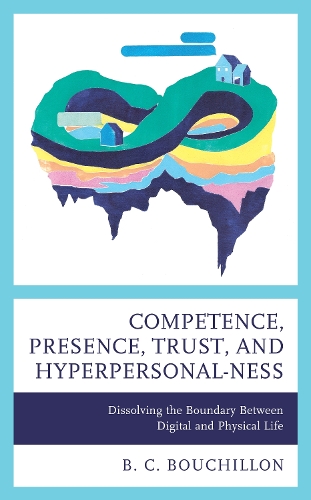
Competence, Presence, Trust, and Hyperpersonal-ness: Dissolving the Boundary between Digital and Physical Life
(Hardback)
Publishing Details
Competence, Presence, Trust, and Hyperpersonal-ness: Dissolving the Boundary between Digital and Physical Life
By (Author) B. C. Bouchillon
Bloomsbury Publishing PLC
Lexington Books
28th January 2022
United States
Classifications
Professional and Scholarly
Non Fiction
Communication studies
302.30285
Physical Properties
Hardback
140
Width 160mm, Height 230mm, Spine 15mm
404g
Description
As the U.S. population grows increasingly withdrawn and less trusting, this book considers the importance of communication technology that allows users to become socially competent in ways that transcend digital and physical modes of communication. Framing computer-based settings as realistic and intimate allows us to convert networked social capabilities into interpersonal competence, Bouchillon argues, and ultimately leads to a higher level of trust. Bouchillon posits that this is a way to encourage diverse social contact locally, using technology to facilitate social learningfor example, during the COVID-19 pandemic, socially distanced individuals worked harder at using technology to replicate their interpersonal lives, leading to increased feelings of capability and trust that benefit both competence and social capital. Scholars of media studies, digital media, and communication will find this book particularly useful.
Reviews
From Riesman et al.'s Lonely Crowd to Putnam's Bowling Alone, the crucial question arises about how our culture and our connections with others characterize and change our lives. Bolstered by quantitative survey data, Brandon Bouchillon's Competence, Presence, Trust, and Hyperpersonal-ness examines these and other vital concerns in light of unprecedented changes in our society, from digital communications to the lack of social presence imposed upon us by pandemic. It is an important and revealing lens into the dynamics of how our communication cultivates social capital in, through and despite the challenges to collaboration and mutual trust brought about by contemporary life. If technology has contributed to our social isolation, Bouchillon optimistically envisions ways in which more competent engagement with and through such technology opens up opportunities for transformation and renewal of social bonds and sociability. We are not automatons but we must increasingly communicate through automata--how we decide to negotiate this interaction interface will increasingly define the quotidian quality of our lives. Attention to the issues of social presence, trust, social capital, computers, and competence in communicating are deservedly at the center of Bouchillon's analysis.
-- Brian Spitzberg, San Diego State UniversityAuthor Bio
Brandon Bouchillon is assistant professor of journalism at the University of Arkansas.
